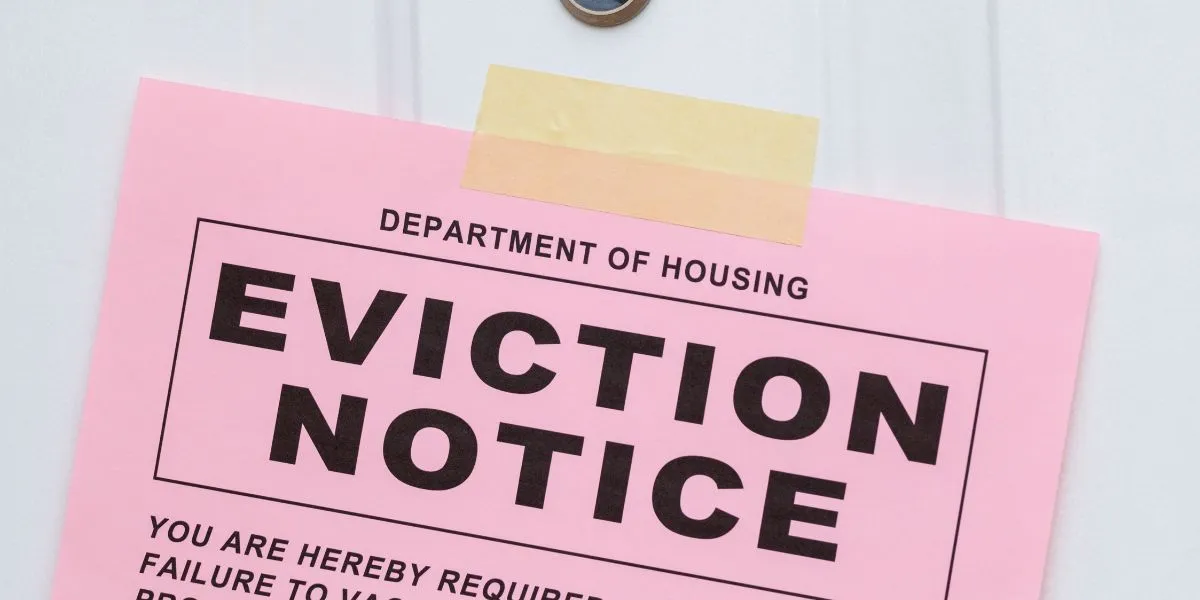15 Essential Tips for Handling an Eviction with Nowhere to Go
Facing eviction with no place to go is a distressing and overwhelming situation that affects many individuals and families.
The consequences of eviction can be severe, leading to homelessness, financial instability, and emotional distress.
In this article, we will explore the impact of eviction without a place to go and discuss essential steps and resources to address this critical issue.

What To Do When Facing Eviction With No Place To Go
If facing eviction with nowhere to go, consider these 15 steps:
1. Reach Out to Family and Friends
When facing eviction with no place to go, your immediate support network can be a valuable resource.
Contact your family and friends to discuss your situation and seek temporary accommodation if possible.
Having a familiar environment and emotional support during this challenging time can help you navigate through the uncertainty.
2. Contact Local Shelters
In times of eviction, local shelters and homeless services can offer vital assistance.
Seek help from these organizations to find emergency housing options available to individuals facing eviction.
They are equipped to provide temporary shelter, meals, and access to essential resources.
3. Seek Assistance from Social Services
Social services agencies and non-profit organizations specialize in helping individuals in need.
Reach out to them for housing support and resources. These organizations can guide you through the process of finding stable housing or connecting you with relevant programs.
4. Explore Legal Aid Services
Understanding your tenant rights and exploring legal options is crucial when facing eviction.
Consult with legal aid organizations to get expert advice and representation.
They can help you navigate the legal complexities and explore possibilities for legal assistance.
5. Look for Temporary Rentals Or Sublets
While searching for a permanent solution, consider short-term housing options.
Search for temporary rentals, sublets, or consider finding roommates to share expenses.
These arrangements can help bridge the gap during eviction and give you more time to find suitable housing.
6. Negotiate with Your Landlord
Open communication with your landlord can sometimes lead to mutually beneficial arrangements.
Engage in negotiations to discuss potential extensions or alternative arrangements.
Being transparent about your situation may lead to finding a resolution that benefits both parties.
7. Check Community Centers and Charities
Local community centers and charitable organizations often offer assistance to those in need.
Explore resources from religious organizations, community centers, and charities that may provide additional support during your challenging time.
8. Utilize Online Resources and Forums
Online platforms and forums can be valuable sources of information and support.
Tap into online resources that offer guidance and assistance for individuals facing eviction or homelessness.
Engaging with online communities can help you discover practical solutions and share experiences.
9. Research Government Housing Programs
Government-funded housing programs and affordable housing initiatives may provide viable solutions.
Investigate available options in your area to determine if you qualify for these programs. Government assistance can be instrumental in securing stable housing.
10. Consider Credit Counseling
Managing debts and exploring financial assistance options are essential steps.
Seek credit counseling services to create a plan for handling your financial situation.
Additionally, explore potential financial aid programs that may offer assistance during this difficult period.
11. Seek Job Assistance Programs
Finding stable employment can greatly improve your situation. Look for job assistance programs that offer support in job hunting and career development.
These programs can help you stabilize your income and increase your financial security.
12. Stay Informed about Tenant Rights and Eviction Laws
Knowledge of your tenant rights and eviction laws is empowering. Educate yourself about your rights as a tenant and understand the eviction laws specific to your region.
This knowledge will give you a better understanding of your situation and potential options.
13. Sell or Store Non-Essential Belongings
To alleviate financial burdens during this time, consider parting with non-essential belongings.
Consider selling or storing items that are not essential for your immediate needs. Doing so can provide some financial relief and make relocation more manageable.
14. Stay in Touch with Your Network
Keep your friends, family, and acquaintances informed about your situation.
Communicate with your network to share your needs and potential opportunities for support.
Your network may be able to offer assistance or connect you with resources.
15. Seek Mental Health Support
The emotional toll of facing eviction can be overwhelming. Prioritize your emotional well-being by seeking support from mental health professionals or support groups.
They can provide a safe space to discuss your feelings and offer coping strategies during this challenging time.
Eviction Consequences: Understanding the Impact of Being Homeless

1. Homelessness
The most immediate consequence of eviction without a new residence is homelessness.
When individuals and families are forced to leave their homes without a safe and stable alternative, they may find themselves living on the streets or in temporary shelters.
Homelessness brings with it significant hardship and danger, exposing people to harsh weather conditions, safety risks, and a lack of access to basic necessities.
2. Health and Well-being
The experience of homelessness and the stress of eviction can have detrimental effects on physical and mental health.
Living in unstable and unsanitary conditions can lead to exposure to illnesses, such as respiratory infections and diseases spread in crowded spaces.
The lack of proper healthcare access and regular meals can worsen existing health issues or lead to new ones.
Moreover, the emotional toll of facing eviction and the uncertainty of not having a place to call home can contribute to anxiety, depression, and other mental health challenges.
3. Disruption of Education
For families with school-going children, eviction can have a profound impact on their education.
Changing schools frequently can lead to a disruption in their academic progress and social development.
Students may struggle to catch up with missed lessons, adapt to new teaching methods, and make new friends in an unfamiliar environment.
This disruption can further widen the educational achievement gap and pose challenges to children’s future opportunities.
4. Loss of Possessions
Eviction can result in the sudden loss of possessions and personal belongings.
When forced to leave a residence quickly, individuals may not have the opportunity to retrieve all their belongings.
Essential items such as clothing, personal documents, sentimental valuables, and basic furniture might be left behind or disposed of.
This loss can have both emotional and financial consequences, leaving people with a sense of detachment from their past and the added burden of replacing necessary items.
5. Employment and Income Loss
Being evicted without a stable residence can make it difficult to maintain stable employment.
Losing a stable living situation may lead to job insecurity, as individuals struggle to maintain a stable work routine without a permanent address.
Additionally, eviction can result in the loss of possessions essential for work, like computers, tools, or work-related documents.
The financial instability resulting from eviction can also impact income streams and make it challenging to meet everyday expenses.

6. Increased Risk of Crime and Victimization
Homeless individuals are at a higher risk of crime and exploitation due to their vulnerable situation.
Living in public spaces or crowded shelters exposes them to potential theft, physical violence, and exploitation.
Homeless individuals may also face discrimination, harassment, and marginalization, which can further exacerbate their already challenging circumstances.
7. Strained Social Services
The influx of newly homeless individuals can strain local social services, including shelters, food banks, and healthcare facilities.
The growing demand for assistance can overwhelm the capacity of these services, making it more challenging for those in need to access the support they require.
As a result, some individuals may not receive timely help, exacerbating their situation.
8. Psychological Impact
Eviction can be a traumatic experience, causing feelings of shame, hopelessness, and despair.
The sudden loss of a home and the uncertainty of finding stable housing can take a toll on one’s mental well-being.
Feelings of worthlessness and failure are common, and individuals may find it challenging to envision a path out of their circumstances.
This psychological burden can also hinder efforts to regain stability and access to resources.
9. Legal Consequences
Eviction may result in a negative rental history, making it difficult for individuals to find future housing.
A past eviction can be a red flag for potential landlords, who might view applicants with skepticism.
Additionally, eviction proceedings can lead to legal disputes, debts, or judgments against the evicted individuals, further impacting their financial standing and credit history.
10. Strained Relationships
Eviction can put strain on relationships, particularly among family members or roommates who may blame each other for the situation.
The stress of eviction and the challenges of homelessness can lead to conflicts and misunderstandings.
This strain on relationships may further isolate individuals from their support network, making it harder for them to access help and assistance.
Common Misconceptions About Eviction and Homelessness

1: Caused by Personal Failures or Bad Choices
Eviction and homelessness are often mistakenly thought to be the result of personal failures or bad choices.
In reality, these issues stem from structural factors like poverty, lack of affordable housing, unemployment, discrimination, domestic violence, or health problems.
Many people facing eviction or homelessness are working, but their income isn’t enough to cover housing costs.
Others may have experienced job loss, medical emergencies, or fled abusive situations, leaving them without a stable home.
Misconception 2: Rare and Temporary Phenomena
Another common misconception is that eviction and homelessness are rare and temporary occurrences.
However, the truth is that these problems affect millions of people worldwide.
According to the United Nations, over 1.6 billion people live in inadequate housing conditions, and at least 150 million are homeless.
In the United States alone, about 553,000 people experience homelessness on any given night, with millions more at risk of eviction.
Moreover, these situations can have long-lasting and devastating impacts on health, education, employment, and social inclusion.
Misconception 3: Solved by Shelters or Transitional Housing
Many people believe that providing shelters or transitional housing can solve eviction and homelessness. While these options offer temporary relief, they are not sufficient or sustainable solutions.
Shelters and transitional housing often have limited capacity, strict eligibility criteria, inadequate facilities, or restrictive rules that exclude those who need help.
Furthermore, they don’t address the root causes of these issues, such as the lack of affordable and adequate housing for all.
The most effective approach to prevent and end eviction and homelessness is to ensure that everyone has access to permanent, affordable, and adequate housing that meets their needs and preferences.
Remember, the right to adequate housing is a human right, and it’s crucial to work towards securing this right for all individuals.
FAQs About being evicted with no place to go
What should I do if I am facing eviction with no place to go?
Reach out to local shelters, social services, and family for immediate support and assistance.
Can I negotiate with my landlord to avoid eviction?
Yes, open communication with your landlord may lead to extensions or alternative arrangements.
Will eviction affect my chances of finding future housing?
Yes, a past eviction may impact your rental history and raise concerns for potential landlords.
How can I cope with the emotional toll of eviction and homelessness?
Seek mental health support from professionals or support groups to prioritize your emotional well-being.
Final Thoughts
Facing eviction with no place to go is a daunting and life-altering experience that can have severe consequences for individuals and families.
Communities and governments must provide support and resources to prevent homelessness and alleviate the challenges posed by eviction.
Through compassion and collective efforts, we can work towards creating a more secure and stable environment for those in need.
Source:
https://selfhelp.courts.ca.gov/eviction-tenant/not-on-lease
https://www.mass.gov/guides/tenants-guide-to-eviction
Yes I had the law to come by here from my landlord has had me a victim and they are ready to move me out I’m 68 years old and disabled and on oxygen I have COPD and a lot of major problems also she bought the house September 23rd and then served eviction notice on me not giving me time to be able to move is there a way I can postpone this from being put out in a couple of days they have served it and said that they would be here with somebody to put me out in my stuff on the side of the street I need help as soon as possible please can you help me I need a way to go or a place to go with my age at 68 I don’t even get my check till the 1st of the month she told me she would give me time but she lied about it please can you help me or what can I do to postpone it for a couple of days till I get my check
Sorry I forgot this is Deborah Coley my phone number is … and I have COPD and on the oxygen and I live in … my email is …@gmail.com please can you help me or tell me how I could just postpone it till I get my check I’m on the base income